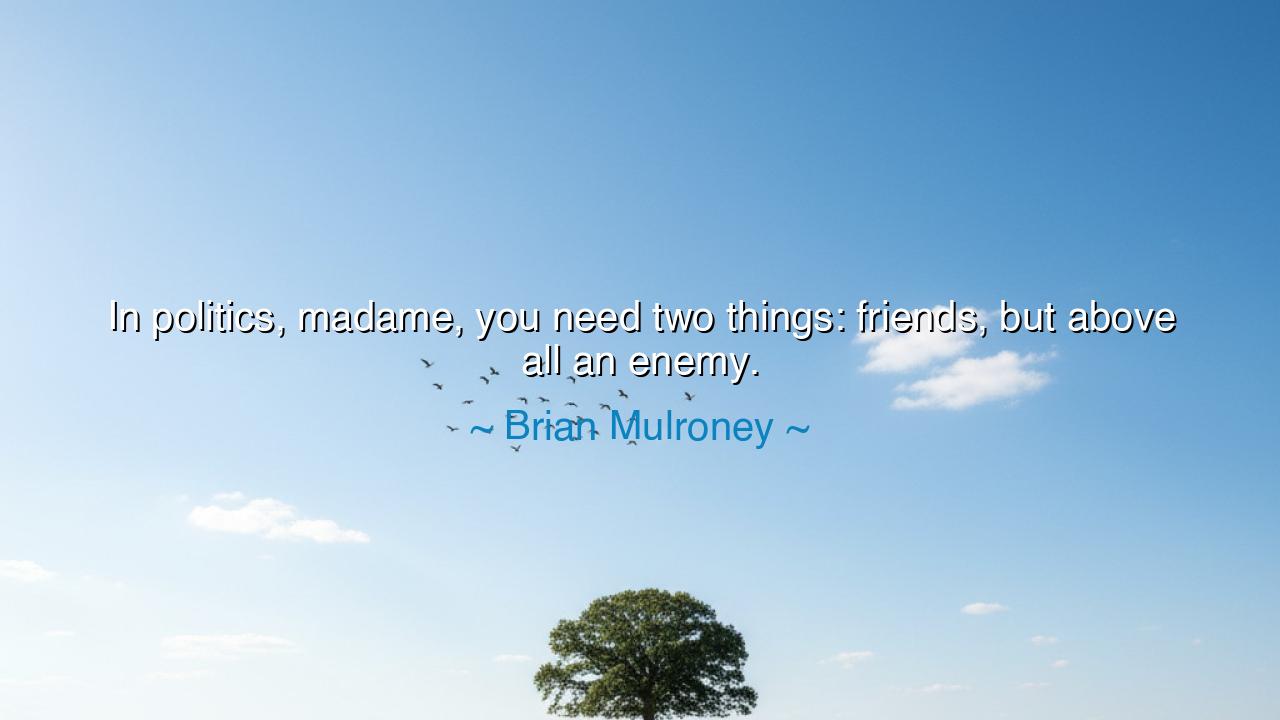
In politics, madame, you need two things: friends, but above all






The words of Brian Mulroney unveil a hard and ancient truth: in the realm of politics, one must possess both friends and, above all, an enemy. For politics is not the tranquil art of harmony, but the ceaseless struggle for allegiance, for power, and for the shaping of destiny. Friends lend strength and counsel, yet it is the enemy who gives purpose, who sharpens resolve, and who provides the field upon which loyalty is tested. Without an adversary, politics becomes but a theater without a stage, a game without consequence.
Consider the annals of Rome, where the great Scipio Africanus rose to immortal fame not merely through his virtues, but through his enmity with Hannibal of Carthage. Rome had friends aplenty—alliances, legions, provinces—but it was the looming figure of Hannibal that united the Republic in common cause. The enemy’s shadow made Rome’s divisions small, and his threat forged her people into steel. Thus the enemy becomes a strange benefactor, summoning strength that peace alone would never have revealed.
So too in modern times: leaders have known that the enemy—whether embodied in a foreign power, an ideology, or a corrupt order at home—serves as the rallying cry to awaken a nation. Franklin Roosevelt, confronting the Great Depression, found his enemy not in a king or general, but in “fear itself,” a foe intangible yet potent enough to unite a weary people. Here we see Mulroney’s wisdom: that to govern, one must point to a danger, a rival, a darkness, so that citizens may find themselves bound together in resistance.
The friend brings counsel, trust, and alliance; but without the enemy, friendship lacks urgency, and unity dissolves. Just as the sword is meaningless without a foe to oppose, so too politics is lifeless without the battle of ideas and the contest of wills. It is in conflict that identity is clarified, that causes are defined, and that the masses learn who stands with them and who stands against them.
Therefore, let this be a teaching for the ages: do not despise the enemy, for in his presence you are made strong. Do not overpraise the friend, for friendship without struggle may wither into complacency. In the art of politics, as in war, it is the adversary who awakens the spirit of the people and forges their destiny. The enemy is not only the obstacle, but also the fire in which the soul of a nation is tempered.






VPNgoc Khanh Vy Phan
It’s interesting how Mulroney views politics as a game of alliances and opposition, but I can’t help but wonder about the ethical implications. If creating an enemy is a necessary part of political strategy, what does that say about the values that guide political leadership? Shouldn't politics, ideally, be about service, solutions, and collaboration rather than power struggles and constant adversarial relationships?
DDNguyen Duc Duong
Mulroney’s quote makes me think about the darker side of political strategy. The idea of creating an enemy might be a tactic to galvanize support, but does it erode trust and goodwill? It seems like this kind of rhetoric can easily escalate tensions and make meaningful dialogue difficult. Can politics truly be effective if the focus is placed more on fighting opponents rather than working together for the greater good of society?
KLNguyen Thi Kieu Linh
The idea that an enemy is necessary in politics seems to reflect a strategy of uniting supporters by creating an ‘us versus them’ mentality. While this may rally people, does it also foster unnecessary conflict? In today’s world, could we not shift the focus to collaboration and understanding, rather than constantly seeking an enemy? How does this approach affect the way politicians govern and represent the interests of the people?
TTdang tuan thanh
Mulroney’s view that an ‘enemy’ is as crucial as friends in politics is striking, but it makes me wonder if this divisive mindset perpetuates conflict rather than cooperation. Does having an enemy encourage a focus on differences instead of common ground? It seems like this kind of dynamic might deepen polarization, especially in a time when unity and bipartisan efforts are desperately needed to tackle global challenges. Is this strategy effective or harmful in the long run?
LNLuan Nguyen
Brian Mulroney’s comment about politics raises an interesting point about the dynamics of power. While having friends in politics is important, the emphasis on having an enemy suggests a more divisive approach. Is this how politics truly operates? Does it rely more on creating opposition than on fostering collaboration? How does this mentality affect the way policies are made and how politicians relate to each other and their constituents?